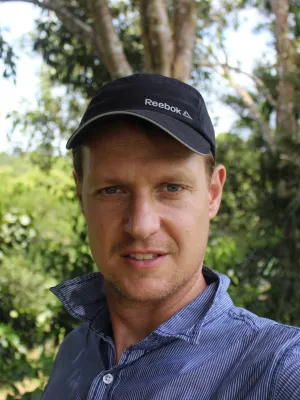
Torsten Krause
Senior Lecturer, Director of PhD Studies

Not Seeing the Forest for the Trees: The Oversight of Defaunation in REDD+ and Global Forest Governance
Author
Summary, in English
Over the past decade, countries have strived to develop a global governance structure to halt deforestation and forest degradation, by achieving the readiness requirements for Reducing Emissions from Deforestation and forest Degradation (REDD+). Nonetheless, deforestation continues, and seemingly intact forest areas are being degraded. Furthermore, REDD+ may fail to consider the crucial ecosystem functions of forest fauna including seed dispersal and pollination. Throughout the tropics, forest animal populations are depleted by unsustainable hunting to the extent that many forests are increasingly devoid of larger mammals—a condition referred to as empty forests. Large mammals and birds, who often disperse seeds of larger more carbon-rich tree species, are preferentially targeted by hunters and the first to be depleted. Such defaunation has cascading ecosystem effects, changing forest structure and composition with implications for carbon storage capacity. Failure to address defaunation would therefore be a major oversight in REDD+, compromising its long-term viability. We carried out a desktop study reviewing REDD+ documents and national implementation efforts in Colombia, Ecuador, Nigeria, Tanzania, and Indonesia to assess the extent to which they address hunting and acknowledged the ecosystem functions of fauna. We also assessed sub-national REDD+ projects to determine whether they recognized hunting and if and how they incorporated hunting management and wildlife monitoring at the project level. Moreover, we assessed to what extent sub-national REDD+ projects addressed the long-term impacts of the sustainability of hunting on forest ecosystem function including carbon storage. We found that hunting, the risk of defaunation, and its effects have been ignored in the REDD+ policy process at both the international and national levels. At the project level, we found some reference to hunting and the risks posed by the loss of forest fauna, albeit only addressed superficially. Our results underline the fact that forest ecosystems are being reduced to their carbon content and that, despite the rhetoric of biodiversity co-benefits, fauna is not treated as a functional component of forests. This neglect threatens to undermine forest ecosystem function and service delivery as well as long-term forest carbon assimilation capacity and hence, ultimately, to compromise REDD+ objectives
Department/s
- LUCSUS (Lund University Centre for Sustainability Studies)
- BECC: Biodiversity and Ecosystem services in a Changing Climate
Publishing year
2019-04-16
Language
English
Publication/Series
Forests
Volume
10
Issue
4
Document type
Journal article
Publisher
MDPI AG
Topic
- Earth and Related Environmental Sciences
Status
Published
ISBN/ISSN/Other
- ISSN: 1999-4907